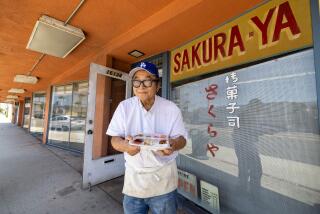Japanese Teens Fuel ‘Name Card’ Craze
- Share via
TOKYO — There are no high fives when Reiko Togashi gets together with her friends. No air kisses or handshakes. There is, instead, a small pause as each teenager rummages in her purse or pocket to pull out a neat box made especially for business cards.
Each girl solemnly exchanges her own card for another’s, closely examines the one she receives and carefully puts it away.
In Japan, the exchange of business cards has long been the essential first step in seemingly every adult relationship other than love. No salesperson, no banker, no corporate executive, no journalist would be without a business card, unless he would also be without shoes, socks and a shirt. And now this longtime ritual has been embraced by teenagers--especially girls.
To hear Togashi and her friends tell it, these days if you live in Japan, are teenage and don’t have an ever-changing array of meishi--literally “name cards”--ready for exchange, forget it. You are the social equivalent of a dead duck. A goner. A loser, baby.
As Togashi explains with the kind of disdain only a 15-year-old can muster: “Even the dasai [geeks] have them.”
Business cards, and the ritual that accompanies them, are so important in Japanese corporate culture that some companies offer employees classes on how to present and accept them with aplomb.
Daisaka Nagaoka, a 25-year-old medical supply salesman, says he learned to exchange cards in this manner: Hold your card in both hands (type facing outward so that the receiver can read it), while bowing at the same time.
Salesmen greeting a potential customer are instructed to let go of their cards with one hand to accept the client’s card first. “There is even role-playing with someone acting as a customer,” Nagaoka says.
In a society where status--age, social position, authority--dictates how people are addressed, a business card is more than simply an efficient way of circulating a company logo. It clearly states to others who you are--and perhaps more important, what you are.
“You can look at a business card and tell that person’s rank and also which department he is in. You know immediately whom you are dealing with,” says Keisaku Ouchi, a retired businessman from Yokohama City.
Meishi traded by teenagers, however, can be even more revealing than the average business card: Sometimes they give clues not only to who the girls are--but who they wish they were.
They may include a girl’s favorite rock band, her pager number and what teenagers call a “live name.”
A live name can be cute. It can be cool. It can be inspired by someone you admire, says Nahoko Kasahara, also known as “Kina.” Most important, she adds, a live name is not the name your parents gave you.
Other teens prefer simply to list their real names, their schools and their pager numbers. “They are in order to let people know who I am,” says Kumi Yuasa, 17, in line to buy cards for the first time.
Throughout Tokyo, the business of selling business cards to kids has blossomed. Vending machines, equipped with computers that allow customers to create their own designs, can be found in video arcades. For about $10, patrons can create and purchase a dozen cards. On weekends, lines at the meishi machines may extend half a block.
And the demand for business cards has spawned an accompanying--and even newer--trend: Teens are snapping up stickers the size of postage stamps featuring tiny pictures of themselves. For about $3, customers can buy 16 tiny self-portraits and, as the computerized vending machine says: “You can put them on a business card. You can put them on an envelope. You can put them on a pager--anywhere you want.”
Mostly, the girls exchange them and put them--by the hundreds, maybe thousands--in booklets resembling photo albums.
On Sunday afternoons, Togashi and about 20 other girls congregate on a wide plaza near Tokyo’s Harajuku subway station. It’s a likely hangout, near the subway and about a block from a street filled with music stores and video arcades--several of which sell make-your-own business cards.
Togashi, wearing white overalls, tiny black T-shirt, silver handcuffs as a bracelet and large, dark glasses, is Madonna-blond. Her cards are purple, inscribed with silver. Her favorite rock band is Luna Sea. Her live name is “Setsuna.”
This week anyway.
Down the street, at Game World arcade, the meishi business is booming.
Two years ago, Mayumi Nishiguchi anticipated the business card craze and began to sell them. Her selection, which features fluorescent colors and glittery type, outshines the standard vending machine offerings.
“I thought I could aim at the high school students,” she says. “It seemed pretty natural. In Japan, when you introduce yourself, you don’t shake hands, you don’t say your name, you use business cards.” Now, the 33-year-old entrepreneur sells an average of 100,000 cards a day--in $15 packets of 30.
As Nishiguchi talks, about 15 girls are waiting patiently for the chance to reaffirm their identities via a business card--or to create completely new ones. A dozen others crowd around a vending machine that sells stickers. Squeals fill the air as the teens compare and exchange newly bought cards.
“This is so cool. This is fabulous. Is it expensive? Oh, man!” says Yuri Ando as she examines an electric blue card inscribed with fluorescent pink.
“The big difference between our cards and businessmen’s cards is that we know each other already--it’s friends,” says Nahoko Kasahara, 15. “But even though we are friends, whenever we change our live names we get new cards. It is not that different.”
Maybe so. But when asked what attracted teenagers to business cards, retired businessman Ouchi looks confounded.
“I have used business cards for 60 years. In business, you know what to expect,” he says. “But this. This? I have no clue.”
More to Read
Inside the business of entertainment
The Wide Shot brings you news, analysis and insights on everything from streaming wars to production — and what it all means for the future.
You may occasionally receive promotional content from the Los Angeles Times.










